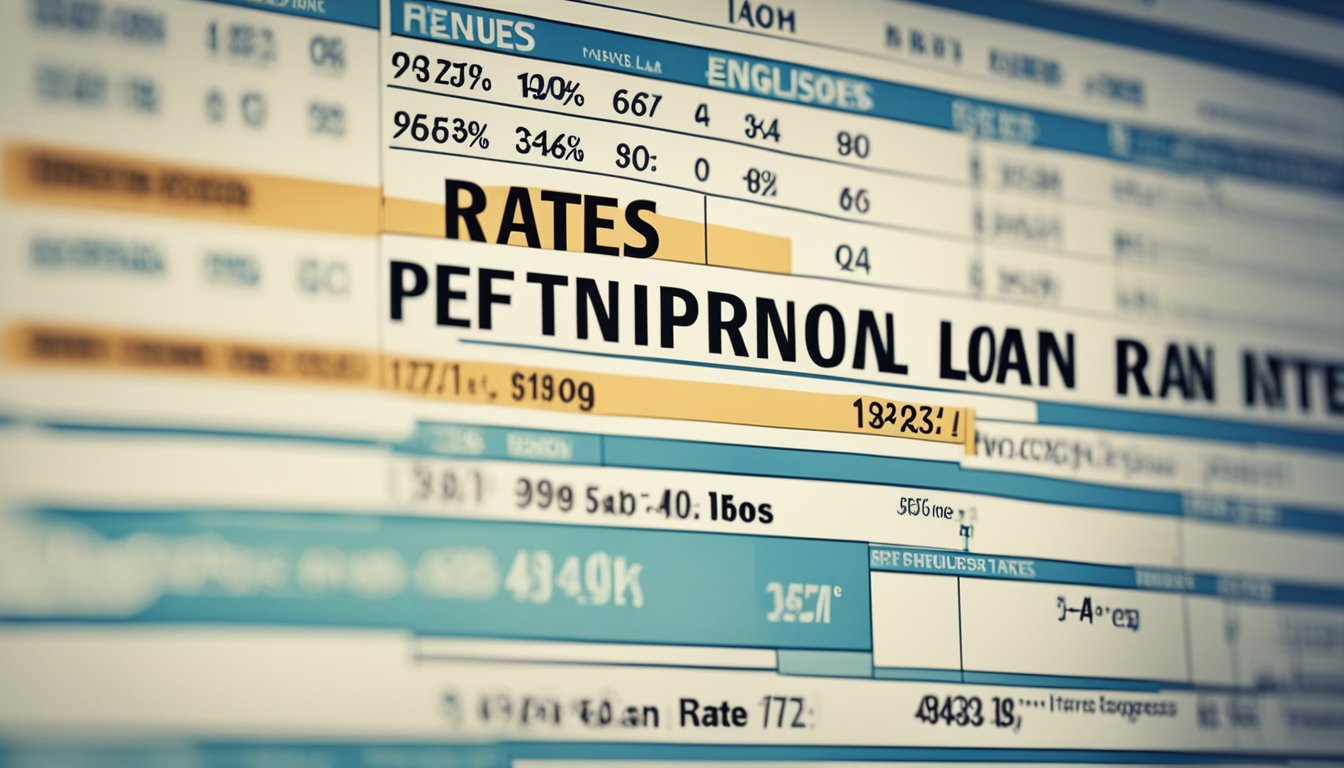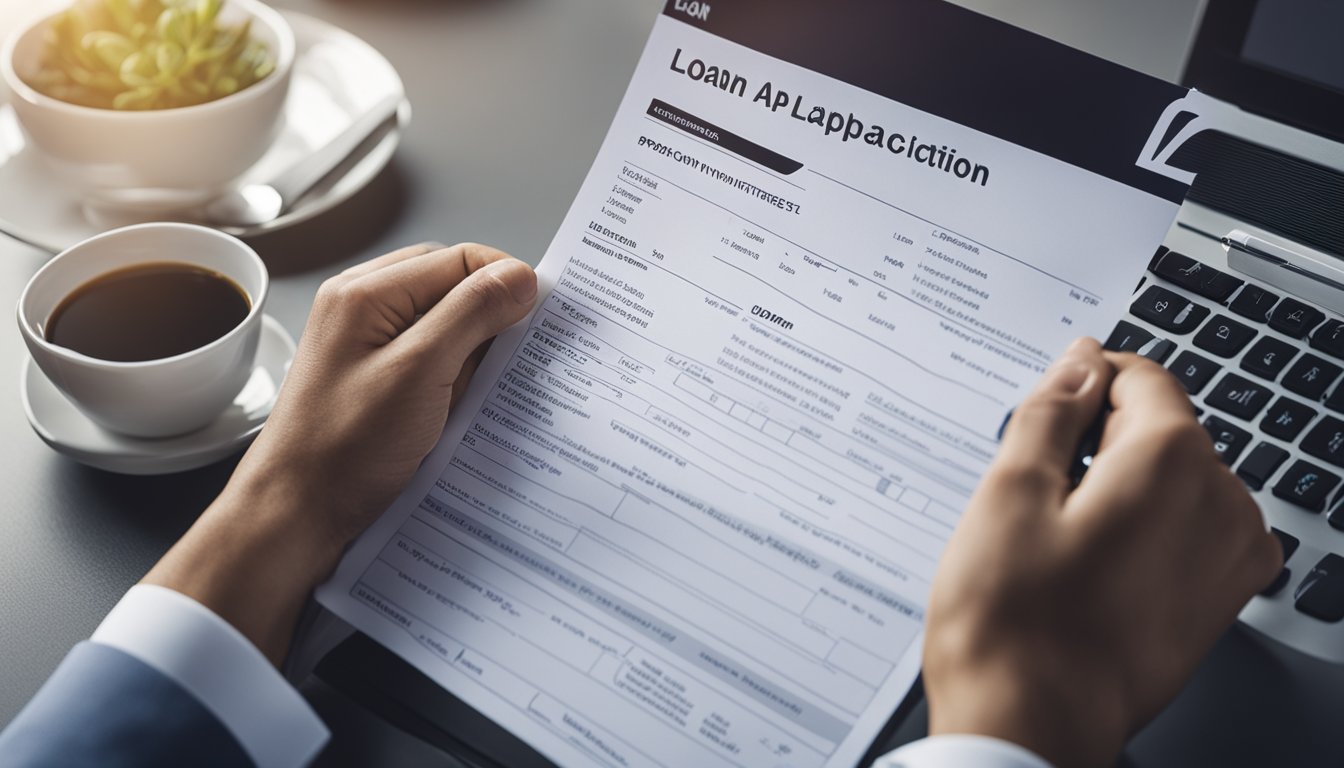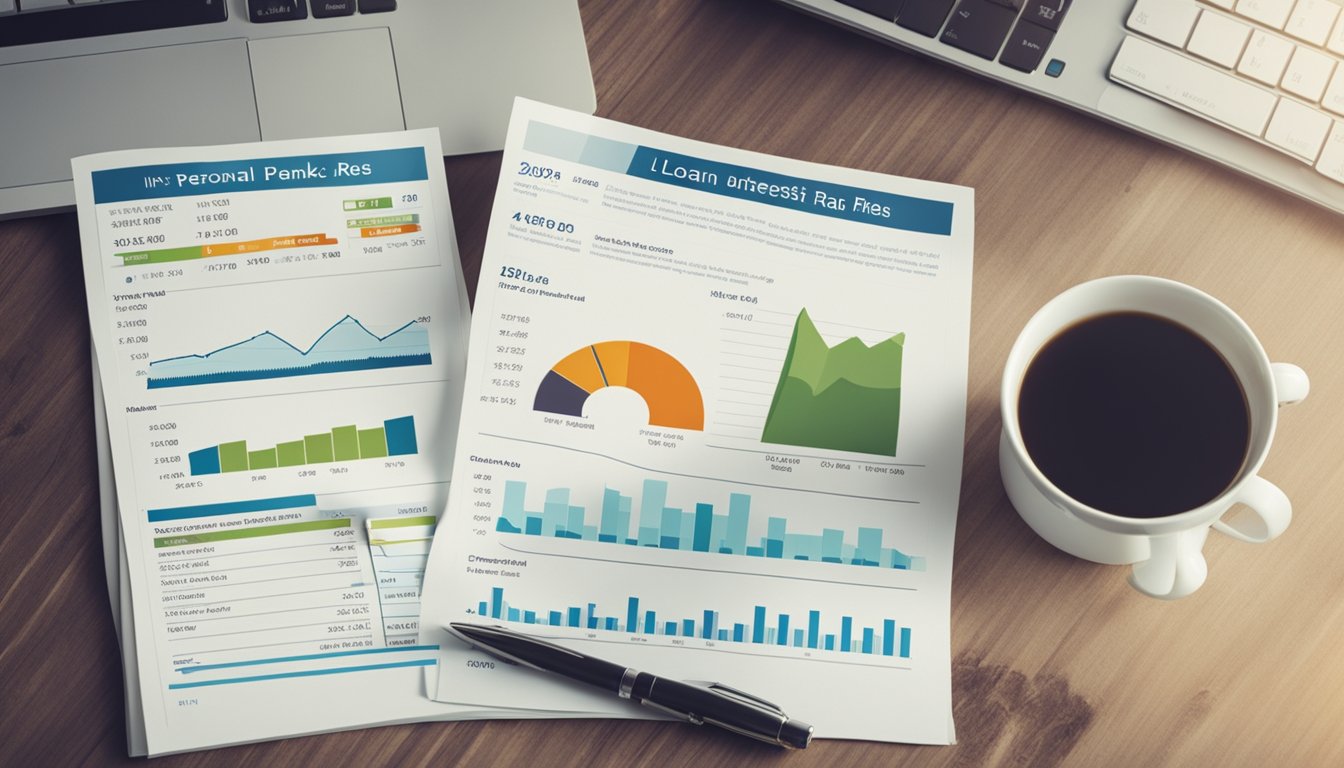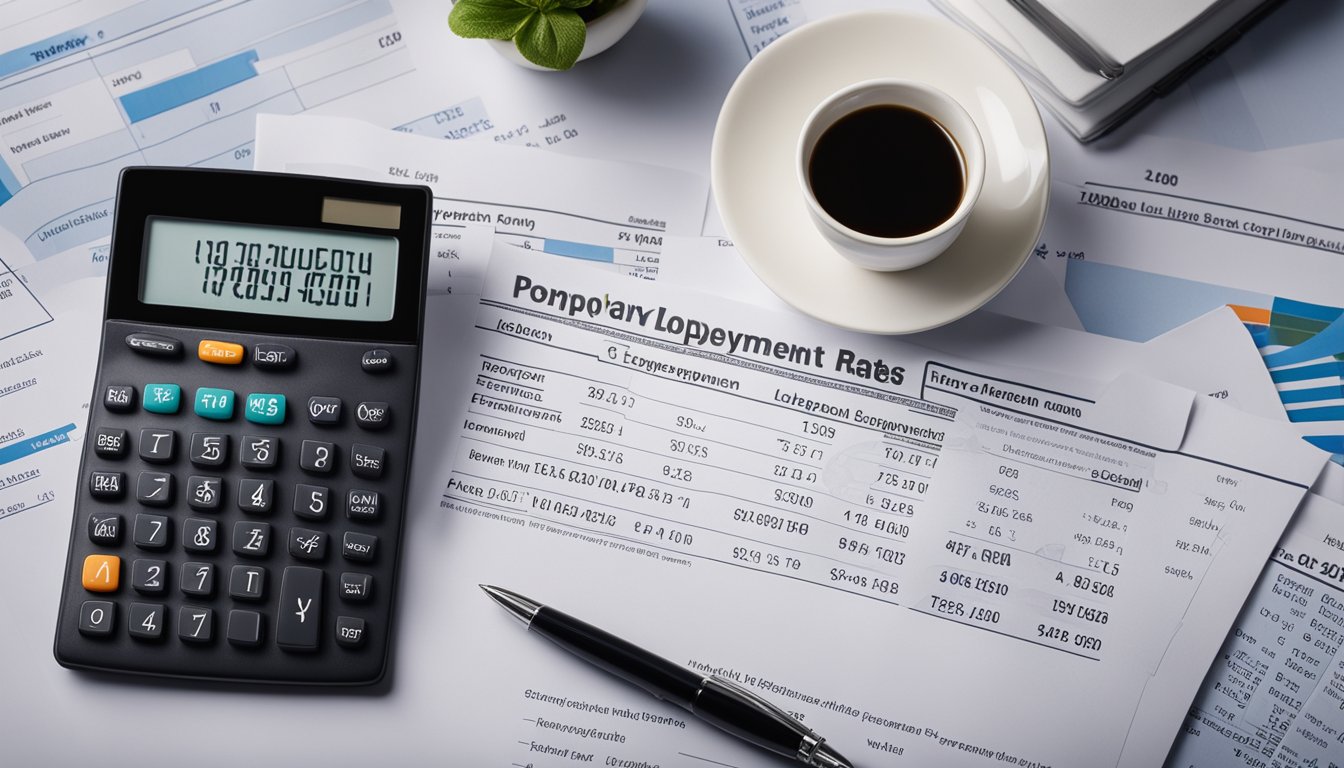Are you looking to take out a personal loan in Singapore? If so, it’s important to understand the interest rate associated with the loan. In simple terms, the interest rate is the cost of borrowing money from a lender. It is expressed as a percentage of the total amount borrowed and is added to the principal amount, which is the amount you borrowed.

The interest rate on a personal loan in Singapore can vary depending on several factors, including the lender, the loan amount, and the loan tenure. It’s important to shop around and compare interest rates from different lenders to find the best deal for your needs. Keep in mind that a lower interest rate can save you money over the life of the loan, but it’s not the only factor to consider when choosing a lender.
3-Minute Overview
For those short on time, here’s a concise breakdown…
Understanding the interest rate on a personal loan in Singapore is key before diving into borrowing. This rate represents the fee charged by the lender for borrowing funds and is crucial for assessing the total cost of the loan.
Unpacking Personal Loan Interest Rates
Personal loan interest rates in Singapore can vary based on several factors such as the lender, loan amount, and repayment period. Expressed as an annual percentage rate (APR), these rates can be fixed or variable. When comparing rates, it’s essential to focus on the effective interest rate (EIR), which encompasses additional fees and charges.
Key Influencing Factors
Several factors influence personal loan interest rates in Singapore:
- Credit Score: Higher credit scores often lead to lower interest rates, while lower scores may result in higher rates.
- Loan Amount: Generally, larger loan amounts may qualify for lower interest rates.
- Repayment Period: Longer repayment periods tend to come with higher interest rates.
- Income: Higher incomes may make borrowers eligible for lower interest rates.
Comparing EIRs from different lenders is vital to understanding the total borrowing cost and finding the most suitable option.
Understanding Additional Costs
Beyond interest rates, borrowers should be aware of additional fees associated with personal loans in Singapore. These may include:
- Processing Fees: One-time charges by the lender for processing the loan application.
- Early Repayment or Cancellation Fees: Fees incurred if the loan is repaid before the term ends or if the loan is canceled.
Comprehending these fees is crucial for evaluating the overall loan cost and making informed decisions.
In summary, when considering personal loans in Singapore, it’s essential to grasp the concept of interest rates, compare EIRs, and consider additional fees to identify the most suitable borrowing option for your financial situation.
Understanding Personal Loan Interest Rates

If you’re planning to take out a personal loan in Singapore, it’s important to understand how interest rates work. Interest rates are the fees charged by the lender for borrowing the money. The interest rate is expressed as an annual percentage rate (APR) and can be either fixed or variable. Personal loan interest rates in Singapore vary depending on several factors.
Advertised Interest Rate vs Effective Interest Rate
When you’re comparing personal loan interest rates, you’ll come across two types of rates – advertised interest rate and effective interest rate (EIR). The advertised interest rate is the rate that the lender advertises to attract customers. However, this rate does not take into account any additional fees that may be charged.
The effective interest rate (EIR), on the other hand, is the actual interest rate that you’ll pay, including any fees and charges. It’s important to compare EIRs instead of advertised interest rates to get a more accurate picture of the total cost of borrowing.
Factors Influencing Interest Rates
Several factors can influence personal loan interest rates in Singapore. These factors include:
- Credit Score: Your credit score is one of the most important factors that lenders consider when setting the interest rate. A higher credit score means a lower interest rate, while a lower credit score means a higher interest rate.
- Loan Amount: The amount you borrow can also affect the interest rate. Generally, the higher the loan amount, the lower the interest rate.
- Loan Tenure: The loan tenure is the length of time you have to repay the loan. A longer loan tenure means a higher interest rate.
- Income: Your income can also affect the interest rate. If you have a higher income, you may be eligible for a lower interest rate.
It’s important to shop around and compare personal loan interest rates from different lenders to get the best deal. Make sure you compare EIRs instead of advertised interest rates and consider all the factors that can influence the interest rate.
Types of Personal Loans in Singapore

If you’re planning to take out a personal loan in Singapore, it’s important to understand the different types of loans available. Here are the most common types of personal loans in Singapore:
Secured vs Unsecured Loans
Secured loans require collateral, such as a car or property, to secure the loan. This means that if you default on the loan, the lender can seize the collateral to recover their money. Unsecured loans, on the other hand, do not require collateral. As a result, they are riskier for lenders and usually have higher interest rates.
Short-Term vs Long-Term Loans
Short-term loans are typically for a period of less than one year, while long-term loans can be for several years. Short-term loans are usually used for emergencies or unexpected expenses, while long-term loans are used for larger purchases like a car or home renovation.
Debt Consolidation Loans
Debt consolidation loans are used to consolidate multiple debts into one loan. This can be a good option if you have multiple high-interest debts, such as credit card debt, and want to simplify your payments and reduce your interest rate.
Renovation Loans
Renovation loans are used to finance home renovations or repairs. These loans can be either secured or unsecured, depending on the lender and the amount of the loan.
Overall, personal loans in Singapore can be a great way to finance large purchases or consolidate debt. However, it’s important to understand the different types of loans available and choose the one that best fits your needs and financial situation.
Eligibility and Application

Eligibility Criteria
Before applying for a personal loan in Singapore, you need to check if you meet the eligibility criteria. Banks and financial institutions in Singapore have specific requirements that you must fulfil to be eligible for a personal loan.
The eligibility criteria for a personal loan in Singapore generally include:
- You must be a Singapore citizen or Permanent Resident
- You must be at least 21 years old
- You must have a minimum annual income of S$20,000
- You must have a good credit score
Some banks may have additional eligibility criteria, so it’s important to check with the bank or financial institution before applying for a personal loan.
Application Process
Once you have confirmed that you meet the eligibility criteria, you can proceed with the loan application process. The application process for a personal loan in Singapore is usually straightforward and can be completed online or in person at the bank.
To apply for a personal loan in Singapore, you will need to provide personal and financial information such as your name, NRIC, income, employment details, and existing debts. You may also need to provide supporting documents such as your payslips, income tax statements, and bank statements.
Most banks in Singapore offer a SingPass login option, which allows you to apply for a personal loan online using your SingPass account. SingPass is a digital identity verification system that enables Singapore citizens and Permanent Residents to access government e-services securely.
Required Documents
To apply for a personal loan in Singapore, you will need to provide the following documents:
- NRIC or passport
- Proof of income (payslips, income tax statements, etc.)
- Proof of employment (employment letter, CPF statement, etc.)
- Bank statements
- Any other supporting documents as required by the bank or financial institution
Make sure you have all the required documents ready before you apply for a personal loan. This will help to speed up the application process and increase your chances of getting approved for the loan.
Comparing Personal Loans from Top Banks

If you are looking for a personal loan in Singapore, you might want to consider taking one from one of the top banks in the country. Here is a comparison of some of the most popular personal loans from top banks in Singapore.
| Bank | Interest Rate | Loan Amount | Repayment Period | Processing Fee |
|---|---|---|---|---|
| DBS | 3.88% p.a. | Up to 10x monthly income | Up to 5 years | 1% of loan amount |
| UOB | 3.68% p.a. | Up to 6x monthly income | Up to 5 years | 1% of loan amount |
| OCBC | 3.5% p.a. | Up to 6x monthly income | Up to 5 years | 1% of loan amount |
| HSBC | 3.7% p.a. | Up to 8x monthly income | Up to 7 years | 1% of loan amount |
| Standard Chartered | 3.48% p.a. | Up to 4x monthly income | Up to 5 years | 1% of loan amount |
| Citibank | 3.99% p.a. | Up to 4x monthly income | Up to 5 years | 3% of loan amount |
DBS Personal Loan
DBS offers a personal loan with interest rates starting from 3.88% p.a. The loan amount can go up to 10 times your monthly income, and you can choose a repayment period of up to 5 years. The loan also comes with a processing fee of 1% of the loan amount.
UOB Personal Loan
UOB offers a personal loan with interest rates starting from 3.68% p.a. The loan amount can go up to 6 times your monthly income, and you can choose a repayment period of up to 5 years. The loan also comes with a processing fee of 1% of the loan amount.
OCBC Personal Loan
OCBC offers a personal loan with interest rates starting from 3.5% p.a. The loan amount can go up to 6 times your monthly income, and you can choose a repayment period of up to 5 years. The loan also comes with a processing fee of 1% of the loan amount.
HSBC Personal Loan
HSBC offers a personal loan with interest rates starting from 3.7% p.a. The loan amount can go up to 8 times your monthly income, and you can choose a repayment period of up to 7 years. The loan also comes with a processing fee of 1% of the loan amount.
Standard Chartered CashOne
Standard Chartered offers a personal loan called CashOne with interest rates starting from 3.48% p.a. The loan amount can go up to 4 times your monthly income, and you can choose a repayment period of up to 5 years. The loan also comes with a processing fee of 1% of the loan amount.
Citibank Quick Cash
Citibank offers a personal loan called Quick Cash with interest rates starting from 3.99% p.a. The loan amount can go up to 4 times your monthly income, and you can choose a repayment period of up to 5 years. The loan also comes with a processing fee of 3% of the loan amount.
When comparing personal loans from top banks in Singapore, it’s important to consider the interest rates, loan amount, repayment period, and processing fee. You should also check if there are any early repayment fees or late payment fees. Make sure to read the terms and conditions carefully before applying for a personal loan.
Loan Costs and Additional Fees

When taking out a personal loan in Singapore, it is important to consider the additional fees and costs associated with the loan. These fees can vary depending on the lender and the loan amount, so it is important to read the terms and conditions carefully before signing up.
Processing Fees and Other Charges
One of the main fees associated with personal loans in Singapore is the processing fee. This is a one-time fee charged by the lender for processing your loan application. The processing fee can vary from lender to lender and can range from 1% to 5% of the loan amount. Some lenders may also charge other fees such as annual fees or late payment fees, so it is important to check the terms and conditions carefully.
Early Repayment and Cancellation Fees
Another important fee to consider when taking out a personal loan in Singapore is the early repayment or cancellation fee. This fee is charged by the lender if you decide to repay the loan before the end of the loan term or cancel the loan altogether. The early repayment or cancellation fee can vary from lender to lender and can range from 1% to 5% of the outstanding loan amount.
It is important to note that some lenders may not charge an early repayment or cancellation fee, so it is important to shop around and compare different lenders before making a decision.
Overall, when taking out a personal loan in Singapore, it is important to consider all the costs and fees associated with the loan. This will help you make an informed decision and ensure that you are getting the best deal possible.
Repayment Terms and Options

When it comes to repaying your personal loan in Singapore, you have a few options to choose from. Here are some of the most common repayment plans:
Monthly Repayment Plans
Most personal loans in Singapore come with a fixed monthly repayment plan. This means that you will need to pay a set amount of money each month towards your loan until it is fully repaid. This type of repayment plan is great if you want to know exactly how much you need to pay each month and want to budget accordingly.
Flexible Repayment Schedules
Some lenders in Singapore offer flexible repayment schedules. This means that you have the option to adjust your monthly instalments based on your financial situation. For example, if you have a sudden increase in expenses one month, you can choose to pay a lower amount towards your loan that month and make up for it later. This type of repayment plan is great if you want more control over your monthly payments and want to be able to adjust them as needed.
No matter which repayment plan you choose, it’s important to make sure that you are able to make your monthly payments on time. Late payments can result in additional fees and charges, which can make it even more difficult to repay your loan.
Financial Planning and Management

When it comes to personal loans, it’s important to have a solid financial plan in place to ensure that you can afford the loan repayments. This means taking into account your income and expenses, as well as any other outstanding debts or financial commitments you may have.
Calculating Your Loan Affordability
To calculate your loan affordability, you need to first determine your annual income and expenses. This will give you a clear idea of how much money you have available to put towards loan repayments each month. You can use a simple spreadsheet or budgeting tool to help you with this.
Once you have a clear idea of your income and expenses, you can then use a loan calculator to determine how much you can afford to borrow. This will take into account factors such as the loan amount, interest rate, and loan term, and will give you an estimate of your monthly repayments.
Managing Loans and Credit Score
Managing your loans effectively is key to maintaining a good credit score. This means making your repayments on time and in full each month, and avoiding taking on too much debt.
If you have a good credit score, you may be eligible for lower interest rates on personal loans. This can help to reduce your overall borrowing costs and make it easier to manage your repayments.
Overall, effective financial planning and management is key to ensuring that you can afford a personal loan and manage it effectively over time. By taking the time to calculate your loan affordability and manage your loans effectively, you can ensure that you stay on top of your finances and maintain a good credit score.
Tip Time! Unlock Smarter Borrowing with Personal Loans:
- Debt Detective: Feeling overwhelmed by numbers? Break down your current expenses with a free budgeting app. Categorize spending, identify hidden “money leaks,” and see how much wiggle room you have for loan repayments.
- Interest Spy: Don’t settle for the first offer! Use online comparison tools to find the loan with the lowest interest rate that fits your needs. Even a small percentage difference can save you big bucks in the long run.
- Bonus Boost: Shorten your loan term if possible. You’ll pay less interest overall and build credit confidence faster by demonstrating responsible repayment. Plus, who wouldn’t love ditching debt sooner?
By taking these proactive steps, you can transform your personal loan experience from stressful to savvy. Remember, careful planning and smart borrowing empower you to achieve your financial goals with confidence!
Additional Considerations for Foreigners

If you are a foreigner living and working in Singapore, there are a few additional considerations you should keep in mind when applying for a personal loan. In this section, we will discuss some of these considerations.
Loan Options for Expatriates
As a foreigner, you may find that some banks and lenders have specific loan options available for expatriates. These loans may have different interest rates, loan amounts, and eligibility requirements than standard personal loans. Some lenders may require that you have a higher income or a longer employment history in Singapore to qualify for an expatriate loan.
It is important to research your options and compare different lenders to find the best loan for your needs. Look for lenders that offer competitive interest rates and flexible repayment terms. You can use the search results provided to find some of the best personal loan options for foreigners in Singapore.
Documentation and Eligibility for Foreigners
When applying for a personal loan as a foreigner, you will need to provide documentation to prove your identity, income, and employment status. This may include your passport, work permit, employment pass, and proof of income such as bank statements or payslips.
In addition to documentation, you will also need to meet certain eligibility requirements to qualify for a personal loan. These requirements may vary depending on the lender, but may include a minimum income threshold, a maximum loan amount, and a minimum employment history in Singapore.
It is important to carefully review the eligibility requirements for each lender before applying for a loan. Make sure that you meet all of the requirements before submitting your application to avoid any delays or rejections.
Alternatives to Bank Personal Loans

If you’re looking for alternatives to bank personal loans, there are several options available to you in Singapore. Here are some of the most popular alternatives:
Credit Lines and Balance Transfers
If you have a credit card, you may be able to take advantage of a credit line or balance transfer. A credit line is a type of revolving credit that allows you to borrow money up to a certain limit. A balance transfer, on the other hand, allows you to transfer your credit card balance to another credit card with a lower interest rate.
Both credit lines and balance transfers can be a good option if you need to borrow money quickly and don’t want to go through the hassle of applying for a personal loan. However, it’s important to note that credit lines and balance transfers often come with higher interest rates than personal loans.
Licensed Moneylenders and Other Options
If you have bad credit or don’t qualify for a bank personal loan, you may be able to get a loan from a licensed moneylender. Licensed moneylenders are regulated by the Ministry of Law in Singapore, and they offer a variety of loans, including personal loans, payday loans, and business loans.
However, it’s important to be cautious when dealing with licensed moneylenders, as some may charge high interest rates and fees. Make sure to read the terms and conditions of the loan carefully before signing anything.
Other options for borrowing money in Singapore include cashlines, which are similar to credit lines, and peer-to-peer lending platforms, which allow you to borrow money from individual investors.
Overall, while bank personal loans are a popular option for borrowing money in Singapore, there are several alternatives available to you if you need to borrow money quickly or don’t qualify for a bank loan.
Frequently Asked Questions
How can expats secure the best interest rates on personal loans in Singapore?
As an expat, you can secure the best interest rates on personal loans in Singapore by having a good credit score, a stable job, and a high salary. You may also want to consider applying for a personal loan from a bank that caters specifically to expats. Do your research and compare interest rates from different banks before making a decision.
Where might one find a personal loan interest calculator for Singaporean banks?
You can find a personal loan interest calculator for Singaporean banks on the websites of the respective banks. Most banks provide a loan calculator that allows you to estimate your monthly repayments based on the loan amount, interest rate, and loan tenure.
Who’s offering the most competitive personal loan rates in Singapore right now?
The most competitive personal loan rates in Singapore right now are offered by HSBC, Citibank, POSB/DBS, Standard Chartered, and UOB. However, it’s important to note that the interest rates may vary depending on your credit score, income, and other factors.
Can my CPF savings influence my personal loan interest rates in Singapore?
Yes, your CPF savings can influence your personal loan interest rates in Singapore. Some banks offer lower interest rates to borrowers who pledge their CPF savings as collateral for the loan. However, you should carefully consider the risks and benefits of using your CPF savings before making a decision.
How does one calculate the monthly repayments for personal loans in Singapore?
You can calculate the monthly repayments for personal loans in Singapore using a loan calculator. The calculator takes into account the loan amount, interest rate, and loan tenure to estimate your monthly repayments. Most banks provide a loan calculator on their website, or you can use a third-party loan calculator.
Is a 6% interest rate considered advantageous for personal loans in the Lion City?
A 6% interest rate may be considered advantageous for personal loans in the Lion City, depending on the prevailing interest rates and your credit score. However, it’s important to compare interest rates from different banks and consider other factors such as processing fees and loan tenure before making a decision.
STREAMLINE YOUR LOAN APPLICATION PROCESS WITH QUICK CREDIT PTE LTD
In Singapore, the demand for Personal Loans has surged significantly. This rise stems from the escalating day-to-day expenses and various personal aspirations, be it planning a vacation or acquiring the latest tech gadgets. These diverse motivations underline the need for financial assistance.
When facing expenses beyond immediate means, a personal loan emerges as a practical remedy.
For individuals seeking financial support, Quick Credit Pte Ltd, a licensed moneylender in Jurong, offers a straightforward application process. Applicants are required to furnish:
- NRIC / Work Pass
- Latest 3 months payslip
- CPF Contribution Statements
- Proof of Address
